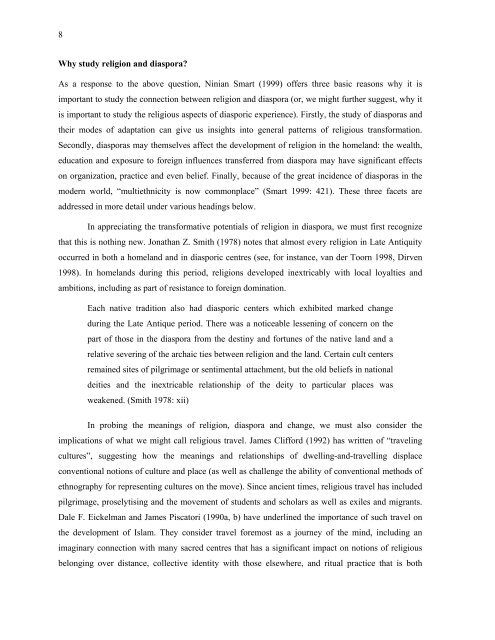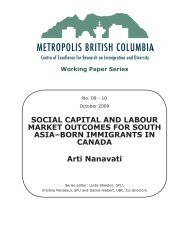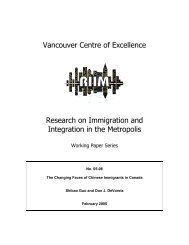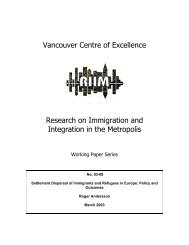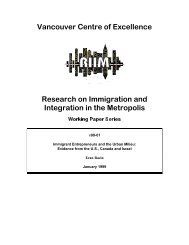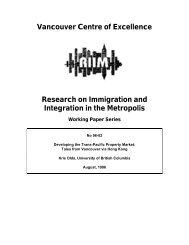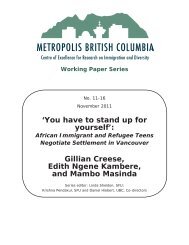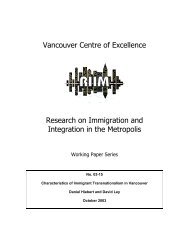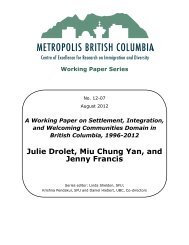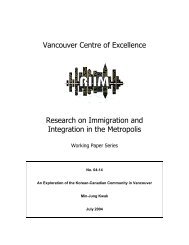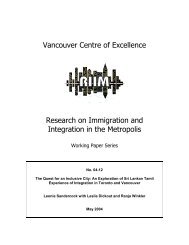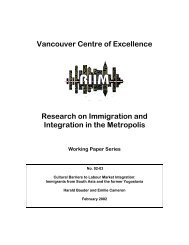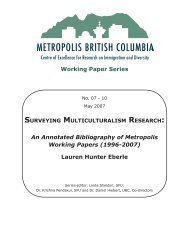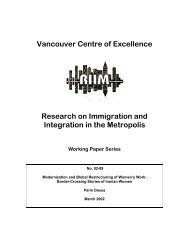Religion in Migration, Diasporas and Transnationalism - Metropolis BC
Religion in Migration, Diasporas and Transnationalism - Metropolis BC
Religion in Migration, Diasporas and Transnationalism - Metropolis BC
You also want an ePaper? Increase the reach of your titles
YUMPU automatically turns print PDFs into web optimized ePapers that Google loves.
8<br />
Why study religion <strong>and</strong> diaspora<br />
As a response to the above question, N<strong>in</strong>ian Smart (1999) offers three basic reasons why it is<br />
important to study the connection between religion <strong>and</strong> diaspora (or, we might further suggest, why it<br />
is important to study the religious aspects of diasporic experience). Firstly, the study of diasporas <strong>and</strong><br />
their modes of adaptation can give us <strong>in</strong>sights <strong>in</strong>to general patterns of religious transformation.<br />
Secondly, diasporas may themselves affect the development of religion <strong>in</strong> the homel<strong>and</strong>: the wealth,<br />
education <strong>and</strong> exposure to foreign <strong>in</strong>fluences transferred from diaspora may have significant effects<br />
on organization, practice <strong>and</strong> even belief. F<strong>in</strong>ally, because of the great <strong>in</strong>cidence of diasporas <strong>in</strong> the<br />
modern world, “multiethnicity is now commonplace” (Smart 1999: 421). These three facets are<br />
addressed <strong>in</strong> more detail under various head<strong>in</strong>gs below.<br />
In appreciat<strong>in</strong>g the transformative potentials of religion <strong>in</strong> diaspora, we must first recognize<br />
that this is noth<strong>in</strong>g new. Jonathan Z. Smith (1978) notes that almost every religion <strong>in</strong> Late Antiquity<br />
occurred <strong>in</strong> both a homel<strong>and</strong> <strong>and</strong> <strong>in</strong> diasporic centres (see, for <strong>in</strong>stance, van der Toorn 1998, Dirven<br />
1998). In homel<strong>and</strong>s dur<strong>in</strong>g this period, religions developed <strong>in</strong>extricably with local loyalties <strong>and</strong><br />
ambitions, <strong>in</strong>clud<strong>in</strong>g as part of resistance to foreign dom<strong>in</strong>ation.<br />
Each native tradition also had diasporic centers which exhibited marked change<br />
dur<strong>in</strong>g the Late Antique period. There was a noticeable lessen<strong>in</strong>g of concern on the<br />
part of those <strong>in</strong> the diaspora from the dest<strong>in</strong>y <strong>and</strong> fortunes of the native l<strong>and</strong> <strong>and</strong> a<br />
relative sever<strong>in</strong>g of the archaic ties between religion <strong>and</strong> the l<strong>and</strong>. Certa<strong>in</strong> cult centers<br />
rema<strong>in</strong>ed sites of pilgrimage or sentimental attachment, but the old beliefs <strong>in</strong> national<br />
deities <strong>and</strong> the <strong>in</strong>extricable relationship of the deity to particular places was<br />
weakened. (Smith 1978: xii)<br />
In prob<strong>in</strong>g the mean<strong>in</strong>gs of religion, diaspora <strong>and</strong> change, we must also consider the<br />
implications of what we might call religious travel. James Clifford (1992) has written of “travel<strong>in</strong>g<br />
cultures”, suggest<strong>in</strong>g how the mean<strong>in</strong>gs <strong>and</strong> relationships of dwell<strong>in</strong>g-<strong>and</strong>-travell<strong>in</strong>g displace<br />
conventional notions of culture <strong>and</strong> place (as well as challenge the ability of conventional methods of<br />
ethnography for represent<strong>in</strong>g cultures on the move). S<strong>in</strong>ce ancient times, religious travel has <strong>in</strong>cluded<br />
pilgrimage, proselytis<strong>in</strong>g <strong>and</strong> the movement of students <strong>and</strong> scholars as well as exiles <strong>and</strong> migrants.<br />
Dale F. Eickelman <strong>and</strong> James Piscatori (1990a, b) have underl<strong>in</strong>ed the importance of such travel on<br />
the development of Islam. They consider travel foremost as a journey of the m<strong>in</strong>d, <strong>in</strong>clud<strong>in</strong>g an<br />
imag<strong>in</strong>ary connection with many sacred centres that has a significant impact on notions of religious<br />
belong<strong>in</strong>g over distance, collective identity with those elsewhere, <strong>and</strong> ritual practice that is both


